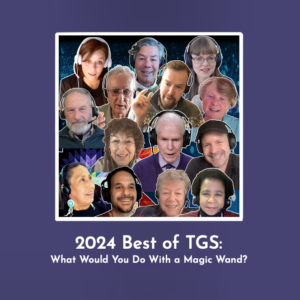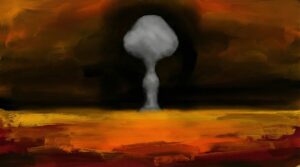
Ep 157 | Nate Hagens
Best of TGS: What Would You Do With a Magic Wand?
Show Summary
This year on The Great Simplification, we heard from 54 guests, 18 Reality Roundtable panelists, and Nate shared his thoughts across 31 Frankly episodes. But even after releasing 300+ hours of conversations and reflections since this show began, we are only just beginning to connect all the moving parts that make up The Human Predicament.
As 2025 approaches, we invite you to reflect on this compilation of answers to a question that Nate asks every guest: “If you could wave a magic wand – and there was no personal recourse to your decision, what is one thing you would do to improve human and planetary futures?”
While some of these answers would truly take magic to achieve, and others involve actions that we have the power to enact on the individual level and within the communities around us right now, we hope you feel motivated and inspired by the magical thinking of these experts to wave a wand wherever you find yourself in the unfolding story of The Great Simplification.
Thank you so much for your continuing support, and for caring so deeply about the topics of this show.
So, what would you do with a magic wand?
In French, we have a motto that says that a simple drawing is often better than a long explanation. Jean-Marc Jancovici Carbone 4 President
That’s very understandable because with left atmosphere thinking, one of the problems is that you see everything as a series of problems that must have solutions. Iain McGilchrist Neuroscientist and Philosopher
We can’t have hundreds and hundreds of real relationships that are healthy because that requires time and effort and full attention and awareness of being in real relationship and conversation with the other human. Nate Hagens Director of ISEOF
This is the crux of the whole problem. Individual parts of nature are more valuable than the biocomplexity of nature. Thomas Crowther Founder Restor
Show Notes & Links to Learn More
02:08 – Fritjof Capra + TGS Episode
02:38 – Joe Roman + TGS Episode
03:25 – Sandra Faber + TGS Episode
04:08 – Andrew Millison + TGS Episode
04:50 – Mamphela Ramphele + TGS Episode
05:45 – Janine Benyus + TGS Episode
06:35 – John Fullerton + TGS Episode
07:00 – Ashley Hodgson + TGS Episode
08:05 – Jonathan Rowson + TGS Episode
09:16 – Jane Muncke + TGS Episode
10:01 – Jeremy Grantham + TGS Episode
10:56 – William E. Rees + TGS Episode
11:56 – Nina Simons + TGS Episode
12:46 – Casey Camp-Horinek + TGS Episode






